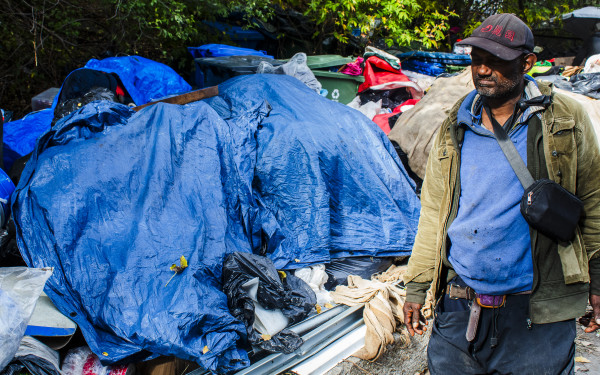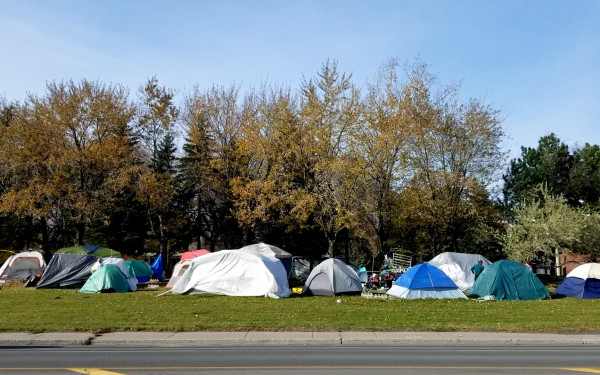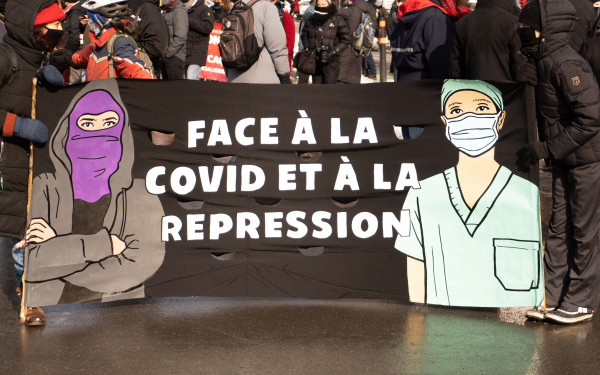Housing Rights Activists Protest Ville-Marie Encampment Demolition
Union Rallies as Government Considers Dismantling Camp Sheltering Unhoused People
Jacco Stuben has lived in the Ville-Marie expressway encampment on and off for more than seven years. Over the past few months, he has noticed an increase in confrontations between unhoused people living in the encampment and Montreal police.
Stuben described the current situation between the police and the encampment as incredibly tense. Officers have been pressuring the unhoused to seek shelter services, even though there is often no place for them to go. “It's very hard because they come here and tell us ‘no, we won't give you a written warning, we'll give you a verbal warning. We just want you guys out.’ A verbal warning just to leave in the middle of snow, that's unrealistic.”
For the past 25 years, Stuben has provided catering and food services for unhoused communities. But because of the increased police presence around the encampment, providing food to people in such a hostile environment has caused him a lot of distress and disrupted him from doing his work. “It's very hard. They come and tell us they don't want us to stay there,” said Stuben.
Despite all the catering and cleaning Ruben provides for the encampment, he feels his work is undermined by their presence. “We are on two legs doing all the work, just living on small amounts plus cooking a lot of food for the homeless. They are just rushing us out. They just want to throw everything up. It's not fair.”
In the event of an eviction, Stuben will be one of many individuals forced out on the street in the winter cold.
He doesn’t understand why the police are considering an eviction in the harsh winter weather—when the community is at its most vulnerable. “This is not the correct way to take care of the homeless in the middle of heavy snow [...] It's a disaster. It's really a cruelty against humans,” Stuben said.
On Feb. 27, demonstrators and members of the Montreal Autonomous Tenants' Union (SLAM-MATU) rallied at Cabot Square to protest a potential planned eviction of the encampment under the Ville-Marie Expressway by Transport Quebec.
SLAM-MATU is a tenant union that advocates for tenants’ rights, organizing residents into self-governing groups using direct action against landlords who have exacerbated the housing crisis. One of their projects in coordination with other advocacy groups is to stand up for the rights of the unhoused living under the Ville-Marie overpass. SLAM-MATU called for the march because residents are facing increased pressure from Transport Quebec to leave the encampment.
“The housing that they are offering is not sufficient. They don’t let visitors in, they have curfew, they’re surveilled; it’s more incarceration rather than housing.” — Jordan Thompson
In November 2022, the police postponed the dismantlement after demonstrators rallied against the displacement of the unhoused community, but SLAM-MATU organizers want all future eviction plans to be cancelled. Protesters marched from the Atwater to Bonaventure metro stations in solidarity with the unhoused community facing the demolition of their current refuge.
According to a member of the group who wished to remain anonymous, Transport Quebec ordered the eviction for maintenance underneath the overpass, leaving no alternative solution for residents. SLAM-MATU believes that without proper consultation with the encampment’s residents, it’s hard to trust Transport Quebec. “They just want to evict them but not really move them anywhere else. And of course, I don't think the people in the camp really want to go anyway. Even if there was an alternative, they basically have no say in what happens to them,” said the anonymous member.
Spokesperson for SLAM-MATU Jordan Thompson demanded that the city provide more housing solutions for both tenants and unhoused people. He also called on the government to cancel all plans concerning an eviction. “Transport Quebec must work with the residents to find permanent stable housing as the residents see fit, not as Transport Quebec sees fit.”
Thompson believes for-profit housing is the root cause of the current housing crisis. Better housing is the most direct solution to help those living in the encampment according to Thompson. He added that provincial and municipal governments are not doing enough to reach out to these communities.
For people like Stuben, while the conditions in the encampment are far from perfect because of the cold and previous members of the camp acting out violently, it’s a better alternative than the shelters provided by the city.
This is not an isolated case, according to Thompson. Those living in the encampment are not doing so by choice, as the resources offered by Montreal are insufficient. Shelters often only allow members to carry one bag of belongings. “The housing that they are offering is not sufficient. They don't let visitors in, they have curfew, they're surveilled; it's more incarceration rather than housing,” he explained.
Getting evicted would be grim for the unhoused people living under the expressway, Thompson said. He explained that shelters are at capacity this time of the year, and that many unhoused people are blocked from entering.
“If they're cleared out from where they live right now, they might just die,” Thompson said. “And that's on the hands of Transport Quebec, [Minister of Transport] Geneviève Guilbault and [Valérie Plante].”




_600_375_90_s_c1.jpg)


